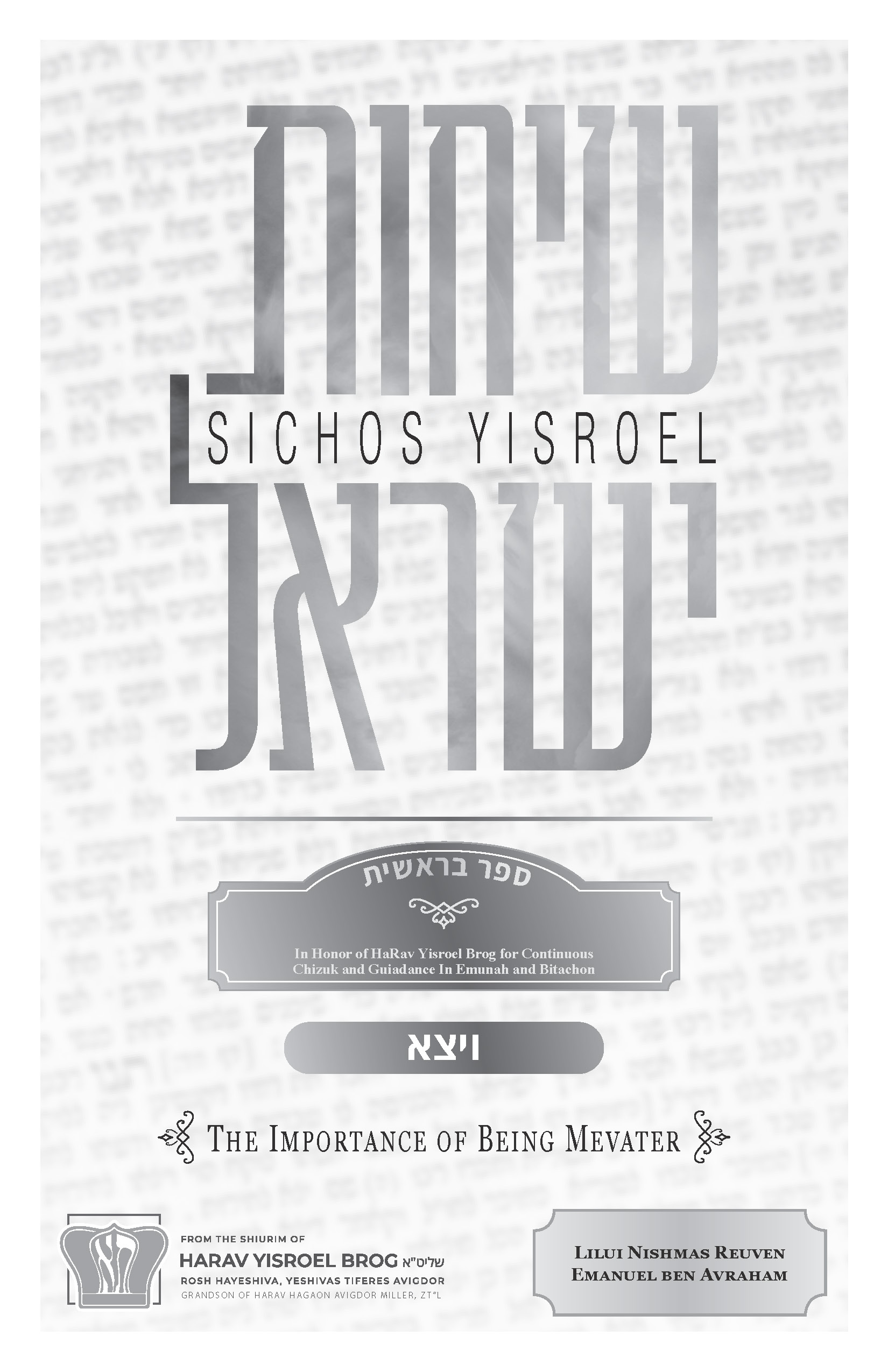Vayeitzei 5784: The Importance of Being Mevater
Sponsored
Lilui Nishmas Reuven Emanuel ben Avraham
Consider sponsoring a shiur
Visit YTATorah.org
Shiur presented in 5778
Parshas Vayeitzei: The Importance of Being Mevater (5778)
Middas Havitur And Rochel Imeinu
In this week’s parshah we encounter an episode of unimaginable proportions. It’s a ma’aseh that we can’t imagine doing. We can’t even fathom it. But we all descend from the person who is the ba’alas hama’aseh.
The Torah tells us how Yaakov worked seven years for Rochel. Seven years is a long time. And Lavan was a taskmaster. He didn’t give Yakov recess like you get. Lavan worked Yaakov to the bone, and he didn’t even pay him. His wages were simply: “After seven years you could marry my daughter, Rochel.” (Bereishis 29:19) Then the big night came, the big chasunah. And the Torah tells us,ויהי בבוקר והנה היא לאה, it was Leah and not Rochel (ibid 29:25).
Chazal tell us Yaakov Avinu gave Rochel simanim because he was concerned that Lavan was going to do a “bait and switch” on him. He told Rochel, “I’m giving you these simanim to let me know that it’s you.” And when Rochel saw that it was not herself being escorted down to the chuppah but rather her sister Leah, Rochel said to herself, “Wow. This is going to be the most embarrassing moment for my sister!” She went over, and she secretly gave her the simanim. She told Leah: “If Yaakov asks you for the password, this is what you say.”
We really have to understand and think about Rochel’s actions. Mitzad hadin, there was no obligation whatsoever on her part to allow Leah to marry her husband-to-be, Yaakov. Yaakov worked for her specifically, for seven years. Rochel’s whole dream (it wasn’t like Rochel was pushed into the wedding and it wasn’t like Lavan sold Rochel against her will) – was to get married to Yaakov. Yet, in spite of that, not only did she not reveal what was going on – by telling Yaakov that there’s a switch here – she didn’t even do שב ואל תעשה by sitting back and saying, “Let’s see how things unfold.” If she would have just kept quiet, Yaakov would have figured it out. It’s not her fault her father switched to Leah. Yaakov would have realized it’s Leah and not Rochel. She didn’t allow that to happen either. She pashut got up on her own, קום ועשה, in order that her sister should not be embarrassed. Not stam. It’s unimaginable!
My rebbi (Rav Meir Halevi Soloveichik) would repeat this ma’aseh and say the following: “What’s the lesson here? What is the Torah telling us? What do we have to take out from this?” And he would then say, “We learn from here how important it is for a person to be mevater and to give in for someone else’s benefit.”
The proportions of this challenge, to me, are mind-boggling. I pictured many times, had I been around in those days and was a confidant of Rochel Imeinu, and she would have said to me, “Yisroel what do you think I should do?” I would have never dreamed of telling her to do what she did. I think maybe I would have said, “I understand you don’t want to cause your sister embarrassment. May I suggest you tell your sister to say that she isn’t feeling well, and then she should take off running. Otherwise, it’s going to be very embarrassing.” No, she did not do anything like that.
The gemora (Taanis 29b) says that Menashe, the evil king Menashe, put a form of avodah zarah in the Beis Hamikdash, in the heichal.[i]It says Rochel Imeinu went before Hakadosh Baruch Hu and she said, “Hakadosh Baruch Hu, רחמיך מרובים מרחמי בשר ודם, Your mercy is greater than the mercy of a human being. והלא אני הכנסתי צרתי בתוך ביתי, did I not allow my competition, my sister, Leah, into my house, ולא די ששתקתי אלא שמסרתי לה סימני, and not only did I keep quiet but I gave her the simanim myself. אף אתה אם הכניסו בניך צרתך בביתך שתוק להם, so too, You, Hakadosh Baruch Hu, even if Your children brought the competition, the idol, into Your house – the Beis Hamikdash – be mochel them.” Rashi says it, in Yirmiyah (31:14), in the name of the medrash.[ii]
As this Medrash teaches us, the benefit of being mevater is that it arouses tremendous amounts of rachamim and mechilah, which we all need as Jews and as a klal. But you have to also understand how important it is to be mevater.
When to Be Mevater…When Not…
There was somebody who was very close to Rav Chaim Kanievsky who presented him with a number of questions about vitur. He asked Rav Chaim the following question: “Somebody has to speak before yom hadin, Rosh Hashanah, regarding some subject. What do you suggest that he should speak about in the area of bein adam lechaveiro?” Rav Chaim said: “Speak about the middah of vitur. It’s הדבר החשוב ביותר. The most important thing. There are many sources in Chazal about it.”
Rav Chaim added: “But you have to know that sometimes it’s asur to be mevater. That is when it’s about matters of ruchniyus. But when it comes to matters of olam hazeh, vitur is the most chashuve thing.”
In the medrash (Bamidbar Rabbah 9:2) in Parshas Naso, the parshah of sotah,it says איש איש כי תשטה אשתו, a man whose wife strayed. Zugt Chazal למדה אותך התורה, the Torah teaches us, שתהא ותרן בתוך ביתך, a very difficult tall order. You should be mevater. On what? Your wife spills the wine. How can you be a vatran? Forget about it. She spills your oil. Be mevater. She tears your kapote or your suit. Be mevater. It gives a whole list of things over there. Whatever happens in your house, be mevater. אבל אם שמעת, but if you hear something about your wife that’s halachically inappropriate behavior, קום כגבר, get up like a man. למה, why? שגבר אתה, because you are a man. So when it comes to gashmiyus, the more you’re mevater the better. When it comes to ruchniyus, you’ve got to be an ish, a man.[iii]
Rav Aharon Leib Shteinman: You Only Gain With Vitur
A certain talmid chacham (Rav Eliyahu Mann) told Rav Chaim Kanievsky that a talmid of Rav Aharon Leib Shteinman asked Rav Shteinman: “The rebbi, Rav Aharon Leib, constantly says people should be mevater and from being mevater you never lose. You only gain. What did the rosh yeshivah gain from the fact that he was mevater many times in his lifetime?” Rav Aharon Leib replied, “I see that Hashem watched over me many times in matters of ruchniyus that were relevant to the tzibbur and if sometimes I forgot a certain fact – when a yediah wasn’t in front of my face – Hashem presented it to me when I needed to know it.”
So Rav Mann now turned to Rav Chaim and asked him, “What’s the middah keneged middah in that? Why is it that if you are mevater you won’t be nichshal (stumble)in rulings?” Rav Chaim said, “When you do לפנים משורת הדין, Hashem also conductsHimself with you לפנים משורת הדין. It’s veryuncommon for a human being to never make mistakes. But somebody who conducts himself לפנים משורת הדין, with vitur, Hashem is also noheg with him לפנים משורת הדין and makes sure that he shouldn’t be nichshal even when it’s the norm to be nichshal. That ‘s the middah keneked middah.”
Rav Chaim Kanievsky’s Big Vitur
On another occasion, Rav Mann turned to Rav Chaim and said, “I have to tell you an interesting thing. I was once in the house of Rav Aharon Leib Shteinman, and he was talking about vitur. Rav Aharon Leib said, ‘Look, I’ll bring a ra’ayah you don’t lose anything from being mevater. Rav Chaim Kanievsky is an only son. Andwhen you have a son and a daughter, the Torah says the son is yoresh everything, and the daughter is not yoresh anything. After the Steipler (Rav Chaim’s father) passed away, Rav Chaim gave everything away to his sister.” Could you imagine that vitur?! Rav Chaim wasn’t a rich Jew. He lived in poverty. And he had plenty of kids. He gave the entire yerushah to his sister who happened to be an almanah. Rav Aharon Leib turned to Rav Mann, and said, “Nu, did he lose anything from that? Baruch Hashem Hashem paid him back for everything kefel keflayim.”
So Rav Mann turned to Rav Chaim and asked: “But why taka was Rav Chaim be’emes mevater toher on everything? The yerushah was yours al pi Torah.”Listen to what Rav Chaim answered him. He said: “My father lived in her house all these years. Es kumt ir,she deserves it.” Unbelievable!
How I Got My House
I had a similar story but in reverse. For twenty-eight years, I lived with my family in the home of my mother-in-law alehah hashalom, who was an almanah. She lived upstairs in the house, and we lived in the basement. At some point in time, there was a discussion about what’s going to happen with the house after she passes on. She said, if her son (who was living here, in Cleveland, at that point when the discussion took place), will be here, “I want him to have the house. He’ll be the Telzer Rosh Yeshivah. He should have the house.” Now, I wasn’t happy about that, but I couldn’t argue about it. I said okay. If that’s what you want, that’s what you want. Then, my brother-in-law moved away. Then a lot of people told me, “I’m sure you’re getting the house. You lived with your mother-in-law for twenty-eight years. I mean you deserve the house, no?!” I said, “I simply asked them if I could live here as long as I’m here. In the end, they gave me a chelek like one of the children.” And when it came time to buy a house, I bought that house from them. I just took off my chelek and the rest I paid to them. I can’t tell you how many people got on my case and said to me, “What kind of business is this? You deserve it.” I told them, “Don’t worry about it. Hashem is going to take care of it. Hashem knows I was here for twenty-eight years. I have no safek that Hashem is going to take care of me.”
The yetzer hara tries to get you. You have to learn to be mevater. You know why? Legally, the house was theirs. Halachically, it was theirs. They weren’t mechuyav to give it to me. They weren’t Rav Chaim Kanievsky. They didn’t have to give it to me. From this, you see Rav Chaim Kanievsky’s middas havitur, how far he went. It’s amazing!
Vitur in Marriage
When Rav Chaim heard about a couple that wanted to have a get, he said that people today don’t know how to conduct themselves. You have to be mevater and mevater. Bederech klal he said, all the issues arise over divrei shtus. He said, for a woman, it is harder to be mevater. That was to me, a chiddush. I once heard from my zeida (Rav Avigdor Miller)not like that. My zeida used to say that a man is like an ox or like a mule, I forget which one. In other words, man is stubborn. The woman should give in. But Rav Chaim said that for an ishah it is harder to be mevater and therefore the responsibility of vitur is on the husband. That’s a big problem though because everybody always says: “Why should I be mevater? You be mevater!”Rav Chaim said: “A ben Torah has to know how to be mevater.”
Vitur Regarding the Amud
A fellow once asked Rav Chaim about davening the amud for his father. What was the shaylah? “Could I be mevater on the amud so that another chiyuv could have the amud on the cheshbon of my father? It’s not my cheshbon. It’s on my father’s cheshbon when I’m not davening from the amud for him.” Rav Chaim told him this vitur is a bigger zechus than being the chazzan. The man asked: “But I know my father. My father himself would have never been mevater in his life. He never would have given in.” Rav Chaim told him, “It’s not a ra’ayah. Now your father is in the olam ha’emes. Now, he knows the emes. He knows it’s a much greater benefit to have you be mevater,and how good it is for him to do it that way than the other way.”
Until you get to that year of kaddish,you can’t imagine how people react if you go to the amud innocently. I’ve had people get in my face. I just went into a shul, nobody was there, one of these minyan factories I went to daven in. Arois. I got pushed. I got pulled. “Not here.” I said, “Isn’t this a minyan factory?” The guy said, “I daven here every day at this time.” I said to him, “You got it, buddy. I’m not messing with your father. But one thing I know about my own father. My father would have definitely been mevater,and he wouldn’t have wanted me to have machlokes with you.” It’s very interesting how people behave.
Building Out: Do Yourself a Favor and be Mevater
Rav Chaim used to say that tzaros that come upon people in inyanim of bein adam lechaveiro come because people are not mevater for each other in inyanei mamanos. One of the most common things in Eretz Yisrael where people have huge machlokes,is when somebody wants to build an extra room in their house. They want to build out. Many times, your extension bothers the guy downstairs. The truth is, though, it often makes it easier for him to extend since now he can add a room more easily because you’re giving him a free roof! But people put up fights that you can’t imagine! You can’t imagine the dinei Torah on this! “You’re taking away my air, my light!” Don’t ask! Rav Aharon Leib used to say, and Rav Chaim said it all the time, “I’m telling you, do yourself a favor and be mevater.”
My son-in-law bought an apartment on the top floor of his apartment building. The building never had an elevator. He told the people, “I’m going to install an elevator.” You’d think they would have kissed his feet. Nechtige tag. “You have to pay us. You have to fix over this. You have to fix over that.” He told them, “I’m doing you a favor.”Now, in his contract, he’s allowed to have a porch, but the guy downstairs says: “What do you mean? For years, there was no roof on top of me!” He told the guy, “You sold that roof. You got paid for it. When the guy built on the roof, he didn’t build on top of the roof without your reshus. He came, and paid you cash to have the zechus to build on top of you. It was paid for.” The guy said: “No, I don’t want you to build.” “Okay, I’ll give you money.” “How much are you going to give me?” Thousands the guy wanted. Thousands! And after that, after he took the money, he’s still not sure he’s going to let him build. My son-in-law is scared to build out. People can’t build. That’s a problem today. People live in small diros. They want to build out and make a little more room, and that’s where the problem of vitur comes in.
Rav Chaim used to say over constantly, when a person is mevater,many times, he will be able to avoid facing difficult nisyonos. Sometimes he’s zocheh to keep his mouth closed besha’as a machlokes. The gemara (Sanhedrin 7a)tells him he’s going to have tremendous brachah.[iv]
When Bizyonos is a Segulah
Rav Mann asked Rav Chaim an interesting thing. He said, “I heard the following episode. Someone came and told Rav Chaim, ‘I didn’t have kids.’ He tried many eitzos and they didn’t work. Rav Chaim told him, ‘I’ll give you another eitzah. In the gemara in Gittin (36b)it says that somebody who receives embarrassment and he doesn’t return the embarrassment, Hashem says about him ואוהביו כצאת השמש, Hashem loves him, like when the sun comes out.[v] This type of person, his brachah is going to be fulfilled. Go, find a Yid that fits that bill, he’s נעלבים ואינם עולבים. Find him and get a brachah from him.’ And the guy did it. He found somebody like that, and he had a yeshuah!”
Rav Mannasked Rav Chaim: “Is this story emes?” You know what Rav Chaim said? “I’ve seen this eitzah in sefarim but I don’t remember whether I had this story with anybody.” He didn’t say, “It’s not true.” He said, “I don’t remember.”
Another time, they asked him the same question. He said, “I don’t remember giving this eitzah but lema’aseh there’s definitely an inyan bazeh.”
Rav Mann was with Rav Chaim when a kid came into the room. A kid from elementary school. He said: “Another boy is embarrassing me in school. Can I return the ‘favor’? Can I pay him back and be ma’aliv him in return so that he should stop, or is it better that I should keep quiet?” Rav Chaim gave him the following eitzah. “It’s not the halachah, but I’ll give you an eitzah. Keep quiet.” Rav Mann was standing there. “What’s his sechar going to be?” He said, “יפה שתיקה עם חכמים – his sechar will be that he’s going to be a chacham,and it’s going to be neskayem in him יפה שתיקה עם חכמים.”
Then Rav Mann told Rav Chaim that he was by Rav Shteinman, and Rav Shteinman said that receiving bizyonos is such a good zach,it’s moradig. He said that if a person is not interested in dying, and he doesn’t want his wife to die chas veshalom, and not his children chas veshalom, bizyonos is the best exchange for kapparah! Rav Shteinman said, “Sadly, I never had bizyonos.”
Bizyonos Come In Different Colors
Rav Mann said to Rav Shteinman: “What do you mean you never had bizyonos? People are talking against you and putting all kinds of pressure on you! They’re mevazeh the rosh yeshivah!” He said, “For me, that’s not bizyonos.” So Rav Mann asked Rav Chaim: “What’s the pshat?” Rav Chaim answered him: “He wasn’t impressed by what people said, so therefore it’s not bizyonos.” He also said that sometimes bizyonos is kavod.
A yungerman once came to Rav Chaim and told himthat he experienced gevaldige tza’ar from a non-frum person in Ramat Gan. He was mevazeh him very much, and the yungerman didn’t respond. He wanted to know from Rav Chaim, is that a fulfillment of נעלבים ואינם עולבים, someone who hears his bushah and doesn’t answer. You know what Rav Chaim told him? “It was like an animal was shaming you.” It’s like an animal embarrassing you. Is that called an embarrassment? It’s not an embarrassment. Embarrassment means when somebody who is an adam mechubad, somebody whose bizyonos has an effect on you and gives you bizyonos. That’s bizyonos.”
A Yid came into Rav Chaim and he had a ta’anah on Rav Chaim.The fellow said: “How do you say things and write things without hearing the second side?” He continued, “I’ll tell you how. Because one of the people in your family, one of the eineklach, has connections over here and they got you to sign it. They got you to write it, and that’s what it is.” He finished his words, and he packed out. The talmid chacham who was present with Rav Chaim at the time turned to Rav Chaim, and said, “Aza chutzpah to say something like this to Rav Chaim?!” Rav Chaim said: “Nah, אני לא דנתי אותו לרע, I didn’t dan him for ra because he’s experiencing tza’ar and אין אדם נתפס בשעת צערו, what a person says when he has tza’ar, he’s not going to be held responsible.”
I once took a bachur in yeshivah on a trial basis. I got along very well with him during the short while he was here. At the end, I told him, “I’m very sorry I don’t think it’s going to work out.” He said, “I know you don’t mean it.” He pulled out a shtar from his pocket. The shtar said, “I, Yisrael Brog, will happily accept so and so in my yeshivah behischayvus.Then he made a line with an x. He put it in my face, and said, “Sign this now.” I said, “You only left out one word in the shtar – I’m not willing to sign it. I will not take you in. I can’t. I’m sorry.” He said, “Drop dead! I hope you don’t wake up tomorrow!” I said, “Thank you.” I told him, “I understand now you’re a little upset.” He said, “I’m giving you the short version of the klalos.” I said, “It’s okay. I have no ta’anos on you.”
Vittur Helps for Yom Hadin
A person has to understand that in life, you have to learn how to be mevater. I’m telling you, you never lose anything from being mevater. Whenever you stick to your guns, even if you’re entitled to it 100%, nu,who knows if it is worth it?A person has to know from Rochel Imeinu, her vitur was out of this world! You’re never ever going to lose from vitur. It’s going to help you in your yom hadin at the end of your life, and it’s going to help you in your yom hadin of Rosh Hashanah. It’s going to help you. When you’re mevater you give yourself wonderful and amazing zechusim when you’re going to need them. If a person is מעביר על מידותיו, Hashem overlooks all his peshaim and all his chataim.
The Bottom Line
The story of Rochel Imeinu’s vatranus in giving up the simanim to Leah is an incredibly powerful example of how “letting go” can bring tremendous rachamin and mechilah to us and our families. Being mevater not only elevates our own ruchniyus, and brings us chochmah, but it makes Hashem conduct Himself middah k’neged middah towards us. Staying away from interpersonal arguments by being mevater in different areas – like we saw from the stories about apartments and balconies in Eretz Yisroel – brings multiple brachos and keeps us safe from danger, that was even decreed upon us (footnote #3 and Rashi there). This week, I will look (bli neder) for an opportunity to “let go” and keep quiet in a small area of my life where I strongly feel I am right (or the halacha is clearly on my side) and the other person is wrong. And in that zechus, may I see much bracha, hatzlacha, and rachamin in my life.
[i] וכן כתוב במלכים ב כ״א:ז: וַיָּשֶׂם אֶת פֶּסֶל הָאֲשֵׁרָה אֲשֶׁר עָשָׂה בַּבַּיִת, וגו’
[ii] רחל מבכה על בניה. מדרש אגדה אמר שהלכו אבות ואמהות לפייס את הקב”ה על שהעמיד מנשה דמות בהיכל ולא נתפייס נכנסה רחל אמרה לפניו רבונו של עולם רחמי מי מרובים רחמיך או רחמי ב”ו הוי אומר רחמיך מרובים והלא אני הכנסתי צרתי בתוך ביתי שכל עבודה שעבד יעקב את אבי לא עבד אלא בשבילי כשבאתי ליכנס לחופה הכניסו את אחותי ולא די ששתקתי אלא שמסרתי לה סימני אף אתה אם הכניסו בניך צרתך בביתך שתוק להם אמר לה יפה למדת סנגוריא יש שכר לפעולתך ולצדקתך שמסרת סימנך לאחותך (רש”י על ירמיהו שם)
[iii] דָּבָר אַחֵר, אִישׁ אִישׁ [“אִישׁ אִישׁ כִּי תִשְׂטֶה אִשְׁתּוֹ וּמָעֲלָה בוֹ מָעַל”,(במדבר ה׳:יב)] לִמְּדָה אוֹתְךָ הַתּוֹרָה שֶׁתְּהֵא וַתְּרָן בְּתוֹךְ בֵּיתֶךָ, נִשְׁפַּךְ יַיִן הֱוֵי וַתְּרָן (משלי ח, כא): לְהַנְחִיל וגו’, וְכֵן שַׁמְנָךְ, (משלי ח, כא): וְאֹצְרֹתֵיהֶם אֲמַלֵּא. נִקְרַע כְּסוּתְךָ (תהלים כ, ו): יְמַלֵּא ה’ כָּל מִשְׁאֲלוֹתֶךָ, אֲבָל אִם שָׁמַעְתָּ דָּבָר עַל אִשְׁתְּךָ קוּם כַּגֶּבֶר, לְמִי שֶׁגֶּבֶר אַתְּ הֱוֵי גֶּבֶר, לְכָךְ נֶאֱמַר: אִישׁ אִישׁ.
[iv] ההוא דהוה קאמר ואזיל טוביה דשמע ואדיש חלפוה בישתיה מאה (רש”י: טוביה דשמע ואדיש – אשריו ששומע חרפתו ושותק ומרגיל בכך ואדיש כמו דדש דש [גיטין דף נו:]; חלפוה בישתיה מאה – הלכו להם בשתיקתו מאה רעות שהיו באות עליו על ידי התגר)
[v] תָּנוּ רַבָּנַן: הַנֶּעֱלָבִין וְאֵינָן עוֹלְבִים, שׁוֹמְעִין חֶרְפָּתָן וְאֵין מְשִׁיבִין, עוֹשִׂין מֵאַהֲבָה וּשְׂמֵחִין בְּיִסּוּרִין, עֲלֵיהֶן הַכָּתוּב אוֹמֵר: ״וְאוֹהֲבָיו כְּצֵאת הַשֶּׁמֶשׁ בִּגְבוּרָתוֹ״.






